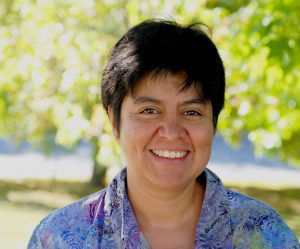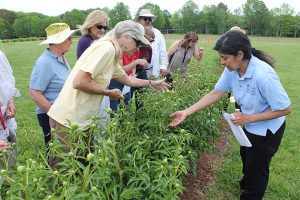Creating Sustainable Landscapes Through the Interactions of Plants and Insects
Educator Spotlight: Ana Legrand
 Ana Legrand built her career around helping people understand the benefits that insects provide. Legrand is an entomologist and UConn Extension educator in the Department of Plant Science and Landscape Architecture. Entomology is the study of insects, and it plays a vital role in our environment and landscapes.
Ana Legrand built her career around helping people understand the benefits that insects provide. Legrand is an entomologist and UConn Extension educator in the Department of Plant Science and Landscape Architecture. Entomology is the study of insects, and it plays a vital role in our environment and landscapes.
“My interest in entomology started when I was young,” Legrand says. “I worked with an agricultural ecology professor in college, and she focused on insects for her research. I saw that it was a good path to follow because I was also interested in agriculture.”
Legrand started working on the project as an undergraduate. Then, she took a class on entomology that showed the formalities and that it could become a profession. “Part of my educational experience was working in the laboratory. I found that collaborating with the graduate students and professors was fun,” Legrand recalls. “I went on to pursue research in graduate school at the University of Maryland because you’re always learning something and that’s exciting. Teaching is also exciting because you are sharing that new information.”
At UConn, Legrand’s research and extension program focuses on plant and insect interactions in vegetable crops. Her work uses insects to enhance biological controls and looks at plant traits that impact insect pests. Legrand’s lab team is investigating plants that attract pests away from crops. Their goal is to trap insects on crops in the early stages before any damage to the food being grown.
Educational outreach including field days and fact sheets target growers and other researchers. “It’s rewarding to find something that wasn’t documented before, even if it’s a small thing,” she says. “I also enjoy seeing the diversity of insects. It might seem like a quiet agricultural field, but it’s really complex with a lot of activity out there.”
 She enjoys getting students and growers excited about insects. Watching undergraduates complete research and pursue entomology in graduate school is also rewarding. “I want everyone to know that insects are a diverse group of animals,” Legrand says. “We face many challenges from pest problems – including health issues. But we also need to appreciate the beneficial insects and make them better allies in what we’re doing. Obviously, there is pollination. But beneficial insects also help with waste management, pest control, and in other areas.”
She enjoys getting students and growers excited about insects. Watching undergraduates complete research and pursue entomology in graduate school is also rewarding. “I want everyone to know that insects are a diverse group of animals,” Legrand says. “We face many challenges from pest problems – including health issues. But we also need to appreciate the beneficial insects and make them better allies in what we’re doing. Obviously, there is pollination. But beneficial insects also help with waste management, pest control, and in other areas.”
Remote sensing for early detection of pest damage is one of her new research projects in agriculture and entomology. Legrand and Bivek Bhusal, her graduate student, are partnering with researchers in the Department of Natural Resources and the Environment. They are using drones to identify insect damage to plants. Analyzing the way the light bounces back from the plant surface helps them find tissue damage and then look for patterns. There is a lot of data, and it has many other applications for agriculture production, specifically in vegetable crops.
Extension educators at several Northeast states are collaborating on a brassica project. The results of their research will enhance agricultural operations. Maussi Arrunategui, another of Legrand’s graduate students, is working on the project with her. Brassica crops include broccoli, cauliflower, cabbage, and turnips. Her research avenues continue expanding and innovating beyond these projects. She is also securing more grant funding to sustain her research and extension initiatives.
“Extension work is valuable, and we want to keep people informed of the latest IPM developments,” Legrand concludes. “There are so many new pest challenges and there are new options available for management of traditional pests. The local environment is important too, our research is more applicable to what people are facing here in Connecticut.”
Article by Stacey Stearns